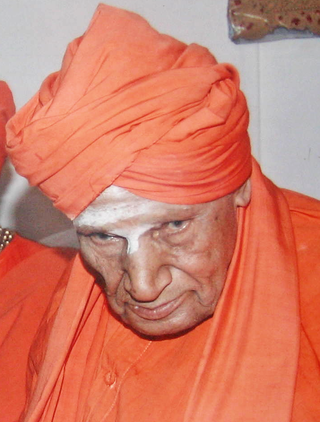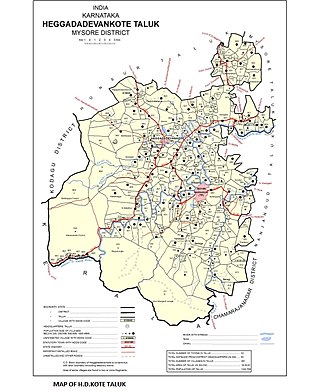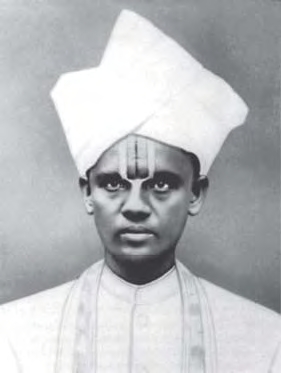
Kodagu district is an administrative district in the Karnataka state of India. Before 1956, it was an administratively separate Coorg State, at which point it was merged into an enlarged Mysore State.

Ramakrishna Mission (RKM) is a Hindu religious and spiritual organisation headquartered in Belur Math, West Bengal. The mission is named after an Indian spiritual Guru, Ramakrishna Paramahamsa. The mission was founded by Ramakrishna's chief disciple, Swami Vivekananda on 1 May 1897. The organisation mainly propagates the Hindu philosophy of Vedanta–Advaita Vedanta and four yogic ideals – Jnana, Bhakti, Karma, and Raja yoga.

Kuppali Venkatappa Puttappa, popularly known by his pen name Kuvempu, was an Indian poet, playwright, novelist and critic. He is widely regarded as the greatest Kannada poet of the 20th century. He was the first Kannada writer to receive the Jnanpith Award.

D. Veerendra Heggade is an Indian philanthropist and the hereditary administrator (0000) of the Dharmasthala Temple. He succeeded to the post at the age of 19, on October 24, 1968, the 21st in his line. He administers the temple and its properties, which are held in trust for the benefit of devotees and of ADharma. He is a nominated Member of Parliament in the Rajya Sabha since July 2022.

Devanahalli, also called "Devandahalli", "Dyaavandalli", Devanadoddi, and Devanapura, is a town and Town Municipal Council in Bengaluru Rural district in the state of Karnataka in India. The town is located 40 kilometres (25 mi) to the north-east of Bengaluru. Devanahalli is the site of Kempegowda International Airport. A multibillion-dollar Devanahalli Business Park with two IT Parks are coming up on nearly 400 acres (1.6 km2) adjoining the airport. An Aerospace Park, Science Park and a ₹10 billion (US$130 million) Financial City are also coming up. A new satellite ring road will connect the city with Doddaballapur. Devanahalli is situated near the upcoming ₹1,500 billion (US$19 billion), 12,000-acre (49 km2) BIAL IT Investment Region, to be the largest IT region in India.

Shivakumara Swami was an Indian humanitarian, spiritual leader, educator and supercentenarian. He was a Veerashaiva Lingayat religious figure. Swami joined the Siddaganga Matha in 1930 Karnataka and became head seer in 1941. He also founded the Sri Siddaganga Education Society. Described as the most esteemed adherent of Lingayatism (Veerashaivism), he was referred to as Nadedaaduva Devaru in the state. In 2015, Swami was awarded by the Government of India the Padma Bhushan, India's third highest civilian award.

Sargur, is a small town located about 80 km from the town of Chamarajanagar And a Taluk of Mysore district of Karnataka, India. H D Kote (Heggadadevanakote) is about 12 km north of Sargur. It is 55 km from the city of Mysore. Bangalore International Airport is 200 km away. To be more elaborate, Sargur is 33.8 km from Nanjangud town (Karnataka), 35.1 km from Gundlupet town (Karnataka), 137.8 km from Udagamandalam town (Ooty) Valley and 38.8 km from Hunsur town (Karnataka).

Dr. Hanumappa Sudarshan is an Indian social worker and tribal rights activist. He is known for his contributions to the upliftment of the forest dwelling tribes in the Chamarajanagar district of Karnataka. He is also a recipient of the Right Livelihood Award and the Padma Shri.

Sri Ramakrishna Vidyashala is a residential school for boys run by the Ramakrishna Mission. It is situated in the southern Indian city of Mysore in Karnataka. It offers a comprehensive education from high school to junior college, or grades eight through twelve. Basically focusing on All-round development of a child. Its former Correspondent, Swami Muktidananda, stated in May 2010: "Sri Ramakrishna Vidyashala accords preference to students from rural areas and economically and socially underprivileged background at the time of admission ... The student profile is divergent and reflective of the entire state of Karnataka."
L. Gundappa M.A. (1903-1986) was a distinguished professor of Kannada literature at Bangalore University and played a pivotal role in the revival of Kannada literature. Inspired by his mentor, B. M. Srikantaiah, Gundappa made significant contributions to the field, particularly in the areas of translation and promoting world literature to Kannada readers.

Sister Gargi, born Marie Louise Burke, was a writer and an eminent researcher on Swami Vivekananda, and a leading literary figure of the Ramakrishna-Vivekananda movement. Gargi was introduced to the Ramakrishna-Vivekananda movement in 1948 by Swami Ashokananda. She is known for her six-volume work, Swami Vivekananda in the West: New Discoveries. Her New Discoveries are considered as indispensable for Swami Vivekananda research.
Jagannath Sarkar was an Indian Communist leader, freedom fighter, and writer on social issues.

Alasinga Perumal was a propagator of Vedanta and an ardent follower of Swami Vivekananda. Born in an orthodox Vaishnavite family at Chikkamagalur of Mysore, he took his education in Madras. After obtaining a B.A. degree in science, he started his career as a school teacher.

Swami Vivekananda Youth Movement (SVYM) is a development organization founded by a group of medicos led by Dr R Balasubramaniam based in Saragur near Mysore in the Indian state of Karnataka. The organization is engaged in building a new civil society in India through its grassroots to policy-level action in health, education and community development. For tribal They have been recognized by private and government bodies inside and outside of Karnataka. Their work in the field of AIDS prevention was recognized by the Indian government. They received awards such as the 'National Youth Award' from the Indian government, and the Mahaveer Award for work in Community and Social Service from the Mahaveer Foundation.

Vivekananda Institute for Leadership Development or V-Lead is an international research and training organisation under Swami Vivekananda Youth Movement, Saragur, India.

Mysore Sandalwood Oil is a trademarked perfume oil extracted from the Santalum album variety of sandalwood tree in the Mysore district of Karnataka, India. The tree species is said to be one of the best varieties in the world.

Ramakrishna Mission Ashrama, Narainpur (RKMN) is a branch centre of Ramakrishna Math and Mission in state of Chhattisgarh. It was founded on 2 August 1985 by Swami Atmananda to serve the tribals of the remote abujhmarh jungle. These tribals were mute victims of oppression and utter neglect for several centuries. The tribals, popularly known as 'Abujhmarias' have been categorised as particularly vulnerable tribal group by the government of India.
Lata Desai is a medical doctor from the Indian State of Gujarat who is 1980 along with her husband Dr. Anil Desai and a few friends founded the Society for Education Welfare and Action - Rural, a voluntary organization devoted to health and development activities in the tribal area of South Gujarat.

Siddeshwar Swami was an Indian Hindu Lingayat spiritual leader known for his teachings on yoga and spirituality. Swami was the head of Jnanayogashrama, an ashram in the city of Vijayapura, in the Indian state of Karnataka. He declined the Padma Shri, India's fourth-highest civilian award, when it was awarded to him in 2018. He had earlier declined an honorary doctorate from the Karnatak University.














